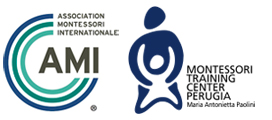Program
The course is divided into:
Theoretical lessons on Montessori Psychology and child development: lectures on Montessori child psychology and child development, and theoretical lessons on the pedagogical teaching practice of Maria Montessori.
Montessori Educational theory and practice: theoretical and practical lessons on the Montessori methodology that illustrate the main pillars on which the cognitive, the emotional and the social development of the child from 3 to 6 years are based.
Introduction to Practical life: development of movement
Exercises on practical life and their role in the child’s acquisition of fundamental learning skills; the coordination and improvement of every single movement that enable the child to acquire independence, gain autonomy and orientation of the surrounding environment.
“Movement is of great importance for a child. Movement is not only an impression of the ego but it is an indispensable factor in the development of the consciousness, since it is the only real means which places the ego in a clearly defined relationship with external reality. The Secret of Childhood page 97.
Introduction to the Sensorial Materials the development and education of the senses
The purpose and use of the sensorial materials as a key to open a door to the exploration and observation of the world. The sensorial material acts as a guide to distinguish and clarify the quality of the things that surround us; the material is a tool to guide and bring order to the multiple perceptions.
“The senses, being explorers of the world, open the way to knowledge. Our apparatus for educating the senses offers the child a key to guide his explorations of the world, they cast a light upon it which makes visible to him more things in greater detail than he could see in the dark, or uneducated state. The Absorbent Mind page 163”
Introduction to Mathematics: the development of the mathematical mind
The material is presented as various levels. The concept of the mathematical mind is much wider than simply the ability to count and calculate. The child, from his earliest years shows a clear tendency for order and precision. So the task of education is not to teach how to count, but rather to allow the development of reasoning skills peculiar to the human being.
Mathematics are necessary because intelligence today is no longer natural but mathematical, and without development and education in mathematics, it is impossible to understand or take any part in the special forms of progress characteristic of our times. From Childhood to Adolescence page 76
Introduction to Language
A rich and wide array of material for the improvement and enhancement of oral language, activities leading to writing and the steps leading to total reading.
“Let us turn now to the child’s development of language. Some reflection on this is necessary, otherwise we may fail to see its connection with social life. Not only does it fuse men into groups and nations, but also it is the central point between the human species and all others. Language lies at the root of that transformation of the environment that we call civilization. The Absorbent Mind page 97”
Observation of Nature as a base to the acquisition of culture
Various materials and classifications are used as a guide for the observation of biology, geography, history, music and art. A sensory approach travels through language to increase the observation of the world.
“What purpose would education serve in our days unless it helped man to a knowledge of the environment to which he has to adapt himself. The Formation of Man page 11”
-Reading/study of Dr. Maria Montessori ‘s books: The students are to read books of Dr. Montessori and make use of them for both their written work/essays as well as practice with material and related discussions.
– Supervised practice with material and activities devised by Dr. Montessori: Montessori material and their role in assisting child development. Practical sessions on various materials to learn how to present the material to the child and reflect on how children experience these materials through their use.
– Supervised teaching practice and observation in Montessori schools: Practical sessions are conducted under the supervision of qualified staff. You will learn how to observe in order to better understand and nurture each child as an individual. Students are required to write reports of their observations which are reviewed and discussed by the trainer.
– Written work: each student must compile a Material Album (Manual) for each area during the course. The albums are the student’s personal record of the work done on the course.
– Material making: a limited amount of material is to be made by the students during the course. This activity shall be supervised.
PROGRAM > |
TEXTBOOKS > |
||
SCHEDULE > |
ADMISSION > |
||
COURSE FEES > |
INTERNATIONAL STUDENTS > |
||
